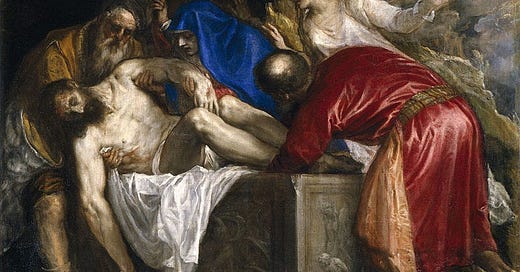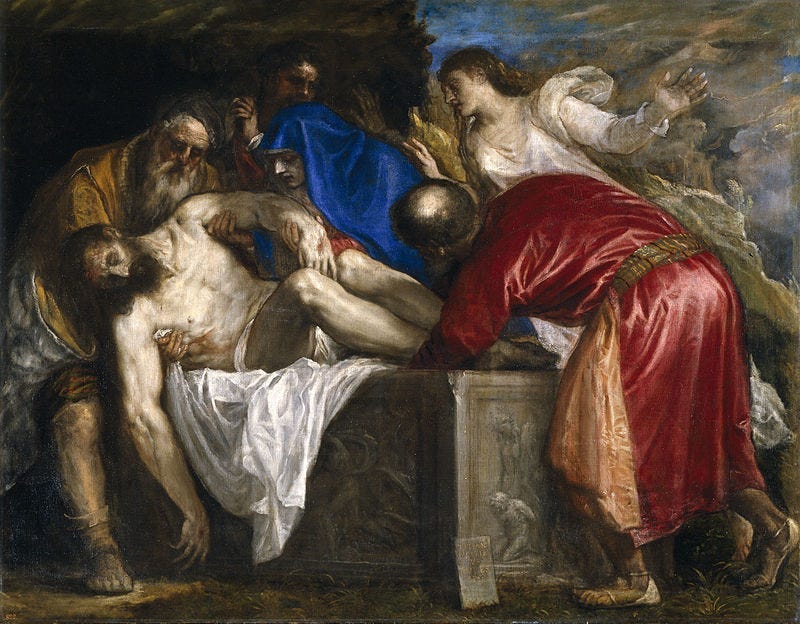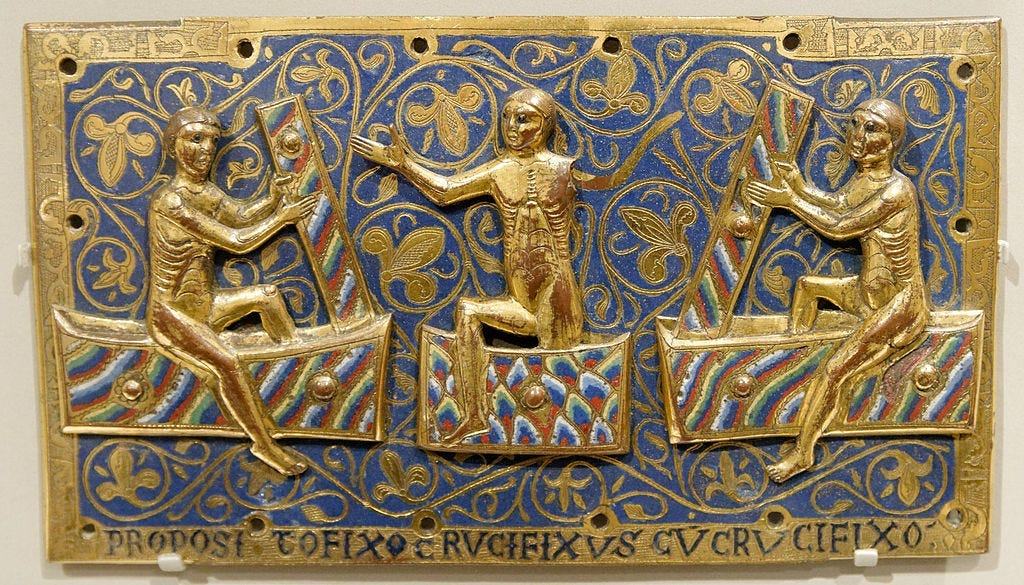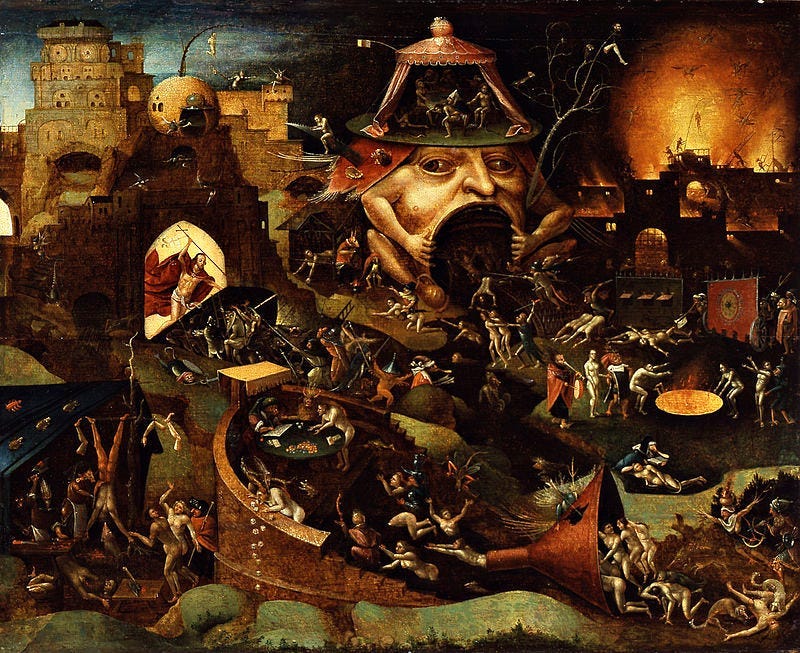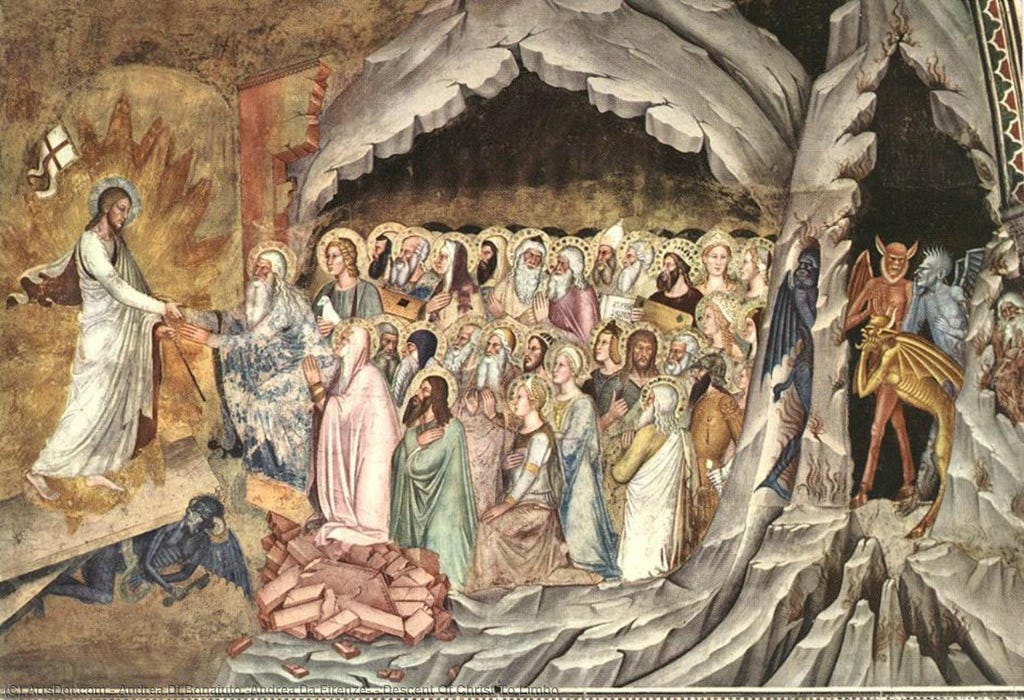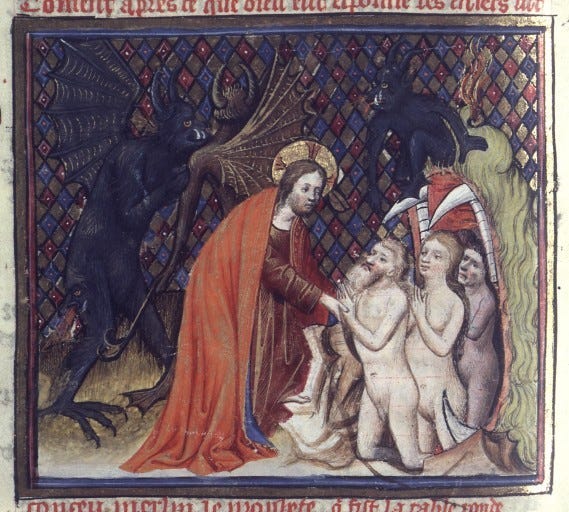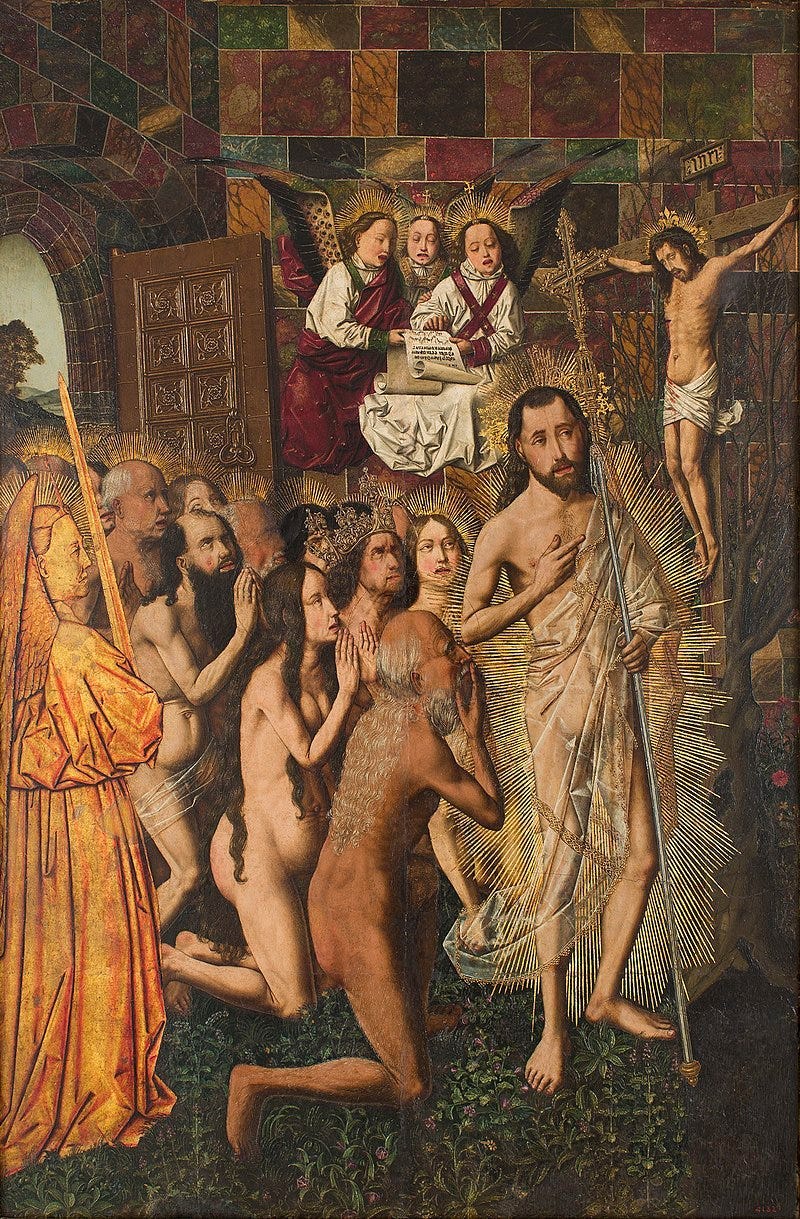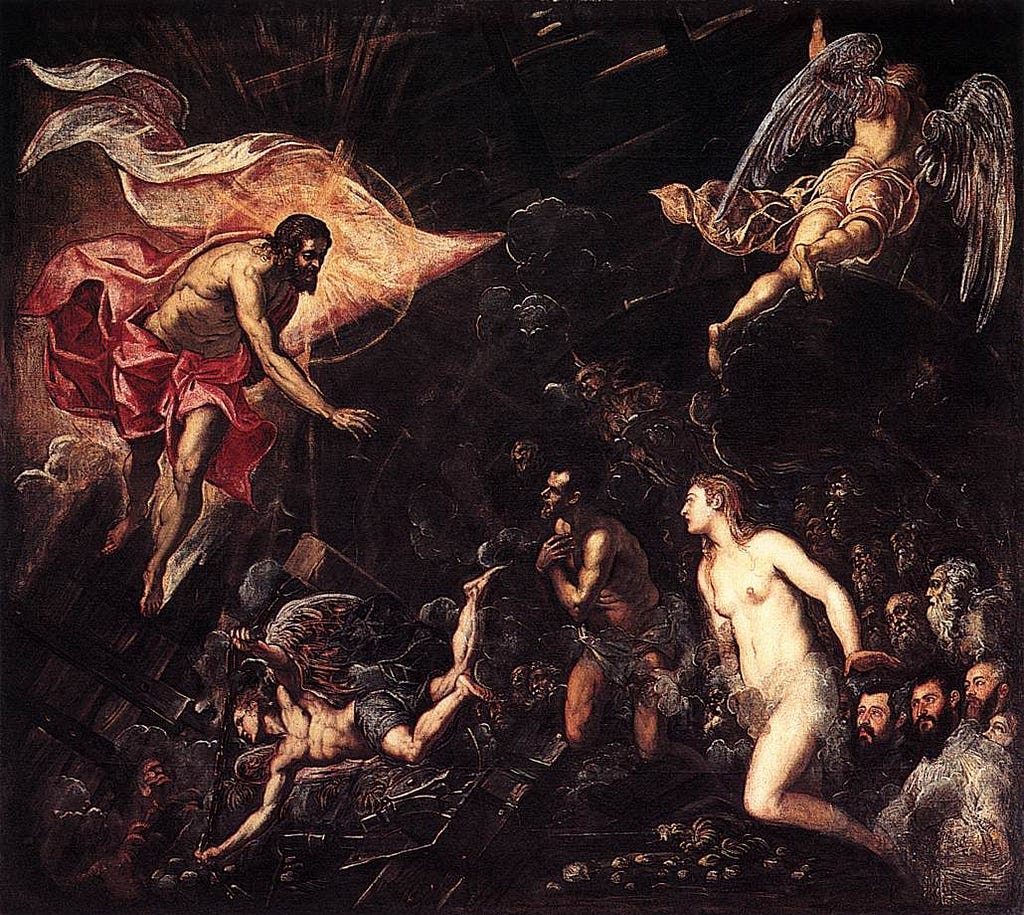According to Christian theology, Jesus died after being crucified by the Romans, then rose from the dead on the third day after his crucifixion. But what was happening to his soul or consciousness during the period between death and rebirth? Considering the impact this legend, myth, or genuine experience has had on human history, it’s curious that it hasn’t been linked explicitly to near-death experiences. It’s even more curious when we look at the various references to Jesus’s experiences between life and death.
Two brief references are found in the New Testament. According to a passage ostensibly written by the apostle Peter around 63 CE, Jesus preached the gospel “even to those who are now dead”; or in an alternative translation, “good tidings were proclaimed to the dead”(1 Peter 4:6). A letter from around the same period, traditionally attributed to Paul, is more explicit. It tells us that Jesus “descended into the lower parts of the earth” before ascending again (Ephesians 4:9).
The Apostles’ Creed, the earliest version of which dates to around 411 CE if not earlier, gives a succinct summary of the event: Jesus “was crucified, died, and was buried, descended into hell, rose again from the dead on the third day, ascended into heaven and is seated at the right hand of God the Father almighty.” This passage is still used in in all the main branches of Christian worship, though some (Methodist and Lutheran, for example) state that “he descended to the dead” — not specifically to hell. This highlights the fact that it was not necessarily a place of damnation and punishment, but rather simply the realm of dead, Sheol, or limbo.
The first appearance of the full story, however, appears in the apocryphal text The Gospel of Nicodemus. The apocrypha are early Christian non-canonical texts, having been ultimately deemed unworthy of inclusion into the New Testament when the book was formalized. This could have been due to the teachings being seen as heretical, or otherwise inconsistent with other parts of the Bible or with the church’s preferred version of Christianity. While existing copies of the he Gospel of Nicodemus date to the 4th or 5th century, the content may date to the 2nd century or even earlier. Nicodemus is mentioned in the New Testament as a man who discussed with Jesus ideas of spiritual rebirth (John 3:1–21), who was present at his crucifixion, and who helped to prepare his body for burial (John 19:39–42).
The story is related to Nicodemus, Joseph, and others by two men named Karinus and Leucius. They were the sons of the high priest Simeon, who “received the child Jesus in his hands in the temple” and prophesied the crucifixion. Karinus and Leucius themselves had returned from the dead following their own crucifixion, so the narrative of their shared NDE — in which they encounter Joseph, Adam, and many other Biblical characters — frames their story of Jesus’s NDE. In other words, their account is ostensibly testimony to three separate NDEs — their own and that of Jesus.
Having taken a vow of silence as commanded during their NDE, Karinus and Leucius wrote their accounts simultaneously. When they had finished writing and their texts were examined, it was found that they were identical.
What follows is their full testimony, translated from the Latin by M.R. James, (now more widely known for his “antiquarian” ghost stories than for his theological work). I have modernized James’s archaisms and punctuation, and have done some judicious editing for ease of reading.
Oh Lord Jesus Christ, the life and resurrection of the dead, suffer us to speak of the mysteries of your majesty which you performed after your death upon the cross. For you commanded us your servants to tell no man the secrets of your divine majesty which you wrought in hell.
Now when we were set together with all our fathers in the deep [of hell], in obscurity of darkness, suddenly there came a golden heat of the sun and a purple and royal light shining upon us. And immediately the father of the whole race of men, together with all the patriarchs and prophets, rejoiced, saying: “This light is the creator of everlasting light who promised to send to us his co-eternal light.” And Esaias cried out and said: “This is the light of the Father, even the Son of God, as I prophesied when I lived upon the earth: The people that walked in darkness have seen a great light, and they who dwell in the land of the shadow of death, upon them did the light shine. And now it has come and shone upon us who sit in death.”
And as we all rejoiced in the light which shined upon us, there came to us our father Simeon, and rejoicing he said to us: “Glorify the Lord Jesus Christ, the Son of God; for I received him in my hands in the temple when he was born a child, and being moved by the Holy Ghost I made confession and said to him: ‘Now have my eyes seen your salvation which you have prepared before the face of all people, a light to lighten the Gentiles, and to be the glory of your people Israel.’” And when they heard these things, the whole multitude of the saints rejoiced yet more.
And after that there came a dweller in the wilderness, and he was inquired of by all: “Who are you?” And he answered them and said: “I am John, the voice and the prophet of the most High, who came before the face of his advent to prepare his ways, to give knowledge of salvation unto his people, for the remission of their sins. And when I saw him coming to me, being moved of the Holy Ghost, I said: ‘Behold the Lamb of God, behold him who takes away the sins of the world.’ And I baptized him in the river of Jordan, and saw the Holy Ghost descending upon him in the likeness of a dove, and heard a voice out of heaven saying, ‘This is my beloved Son, in whom I am well pleased.’ And now have I come before his face, and come down to declare to you that he is at hand to visit us, the Son of God, coming from on high to us who sit in darkness and in the shadow of death.”
And when father Adam who was first created heard this, he cried out to Seth his son, saying: “Declare unto your sons the patriarchs and the prophets all that you heard from Michael the archangel, when I sent you to the gates of paradise.” Then Seth drew near to the holy patriarchs and prophets, and said: “When I, Seth, was praying at the gates of paradise, Michael the angel of the Lord appeared unto me, saying: ‘I am sent to you from the Lord: it is I who am set over the body of man. And I say to you, Seth, vex not yourself with tears, praying and entreating for the oil of the tree of mercy, that you may anoint your father Adam for the pain of his body: for you will not be able to receive it save in the last days and times, save when five thousand and five hundred years are accomplished: then shall the most beloved Son of God come upon the earth to raise up the body of Adam and the bodies of the dead, and he shall come and be baptized in Jordan. And when he is come forth from the water of Jordan, then shall he anoint with the oil of mercy all that believe in him, and that oil of mercy shall be to all generations of them that shall be born of water and of the Holy Ghost, to life eternal. Then shall the most beloved Son of God, even Christ Jesus, come down upon the earth and shall bring in our father Adam into paradise unto the tree of mercy.’”
And when they heard all these things from Seth, all the patriarchs and prophets rejoiced with a great rejoicing.
And while all the saints were rejoicing, Satan the prince and chief of death said to Hell: “Prepare to receive Jesus who boasts that he is the Son of God, whereas he is a man who fears death, and says: ‘My soul is sorrowful even unto death.’ And he has been much my enemy, doing me great hurt, and many that I had made blind, lame, dumb, leprous, and possessed he has healed with a word: and some whom I have brought to you dead, he has taken away from you.”
Hell answered and said to Satan the prince: “Who is he that is so mighty, if he be a man that fears death? For all the mighty ones of the earth are held in subjection by my power, even those you have brought me subdued by your power. If, then, you are mighty, what manner of man is this Jesus who, though he fears death, resists your power? If he is so mighty in his manhood, I say to you that he is almighty in his god-head, and no man can withstand his power. And when he says that he fears death, he would ensnare you, and woe shall be unto you for everlasting ages.” But Satan the prince of Tartarus said: “Why do you doubt, and fear to receive this Jesus which is your adversary and mine? For I tempted him, and have stirred up my ancient people of the Jews with envy and wrath against him. I have sharpened a spear to thrust him through, gall and vinegar have I mingled to give him to drink, and I have prepared a cross to crucify him and nails to pierce him: and his death is at hand, that I may bring him unto you to be subject to us.”
Hell answered and said: “You have told me that it is he who has taken away dead men from me. But there are many who while they lived on the earth have taken dead men from me, yet not by their own power but by prayer to God, and their almighty God has taken them from me. Who is this Jesus which by his own word without prayer has drawn dead men from me? Perchance it is he who by the word of his command restored to life Lazarus who was four days dead and stank and was corrupt, whom I held here dead.” Satan the prince of death answered and said: “It is that same Jesus.” When Hell heard that he replied: “I adjure you by your strength and mine that you bring him not to me. For at that time I, when I heard the command of his word, did quake and was overwhelmed with fear, and all my ministries with me were troubled. Neither could we keep Lazarus, but he like an eagle shaking himself leaped forth with all agility and swiftness, and departed from us, and the earth also which held the dead body of Lazarus straightway gave him up alive. Wherefore now I know that that man who was able to do these things is a God strong in command and mighty in manhood, and that he is the saviour of mankind. And if thou bring him to me he will set free all that are here shut up in the hard prison and bound in the chains of their sins that cannot be broken, and will bring them to the life of his god-head for ever.”
And as Satan the prince, and Hell, spoke together, suddenly there came a voice as of thunder and a spiritual cry: “Remove, oh princes, your gates, and lift up your everlasting doors, and the King of glory shall come in.” When Hell heard that he said to Satan the prince: “Depart from me and leave my abode. If you are a mighty man of war, fight against the King of glory. But what have you to do with him?” And Hell cast Satan out of his dwelling. Then Hell said to his wicked ministers: “Shut the hard gates of brass and put on them the bars of iron and withstand stoutly, lest we who hold captivity be taken captive.”
But when all the multitude of saints heard this, they spoke with a voice of rebuking to Hell: “Open your gates that the King of glory may come in.” And David cried out, saying: “Did I not when I was alive upon earth, foretell to you: ‘Let them give thanks to the Lord, even his mercies and his wonders to the children of men; who has broken the gates of brass and smitten the bars of iron in sunder?’ He has taken them out of the way of their iniquity.” And thereafter in like manner Esaias said: “Did not I when I was alive upon earth foretell to you: ‘The dead shall arise, and they who are in the tombs shall rise again, and they who are in the earth shall rejoice, for the dew which comes of the Lord is their healing?’ And again I said: ‘Oh death, where is thy sting? Oh Hell, where is thy victory?”
When they heard that of Esaias, all the saints said to Hell: “Open your gates: now you shall be overcome and weak and without strength.” And there came a great voice as of thunder, repeating the command to open the gates. And when Hell saw that they so cried out twice, he said, as if he didn’t know: “Who is the King of glory?” And David answered Hell and said: “The words of this cry do I know, for by his spirit I prophesied the same; and now I say to you that which I said before: The Lord strong and mighty, the Lord mighty in battle, he is the King of glory. And that the Lord looked down from heaven that he might hear the groanings of those who are in fetters and deliver the children of those who have been slain. And now, oh most foul and stinking Hell, open your gates, that the King of glory may come in.”
And as David said this to Hell, the Lord of majesty appeared in the form of a man and lightened the eternal darkness and broke the bonds that could not be loosed: and the succour of his everlasting might visited us who sat in the deep darkness of our transgressions and in the shadow of death of our sins.
When Hell and Death and their wicked ministers saw that, they were stricken with fear, they and their cruel officers, at the sight of the brightness of such great light in their own realm, seeing Christ suddenly in their abode, and they cried out, saying: “We are overcome by you. Who are you that is sent by the Lord for our confusion? Who are you that without damage of corruption, and with the signs of your majesty unblemished, wrathfully condemns our power? Who are you that are so great and so small, both humble and exalted, both soldier and commander, a marvelous warrior in the shape of a bondsman, and a King of glory dead and living, whom the cross bare slain upon it? You who lie dead in the sepulchre have come down to us living, and at your death all creation quaked and all the stars were shaken and you have become free among the dead and rout our legions. Who are you that sets free the prisoners who are held bound by original sin and restores them to their former liberty? Who are you that sheds your divine and bright light upon those who were blinded with the darkness of their sins?” After the same manner all the legions of devils were stricken with fear and cried out all together in the terror of their confusion, saying: “From where do you come, Jesus, a man so mighty and bright in majesty, so excellent without spot and clean from sin? For that world of earth which has been always subject to us until now, and did pay tribute to our profit, has never sent to us a dead man like you, nor ever dispatched such a gift to Hell. Who then are you that so fearlessly enters our borders, not only unafraid of our torments, but besides attempts to bear away all men out of our bonds? Perhaps you are that Jesus, of whom Satan our prince said that by your death on the cross you should receive the dominion of the whole world.”
Then the King of glory in his majesty trampled upon death, and laid hold of Satan the prince and delivered him unto the power of Hell, and drew Adam to him unto his own brightness.
Then Hell, receiving Satan the prince, with sore reproach said to him: “Oh prince of perdition and chief of destruction, Beelzebub, the scorn of the angels and spitting of the righteous, why would you do this? You had crucified the King of glory and promised us great spoils of his death: like a fool you knew not what you did. For behold now, this Jesus puts to flight by the brightness of his majesty all the darkness of death, and has broken the strong depths of the prisons, and freed the prisoners and loosed them that were bound. And all that were sighing in our torments rejoice against us, and at their prayers our dominions are vanquished and our realms conquered, and now no nation of men fears us any more. And beside this, the dead who were never wont to be proud now triumph over us, and the captives who never could be joyful threaten us. Oh prince Satan, father of all the wicked and ungodly and renegades, why would you do this? They who from the beginning until now have despaired of life and salvation — now none of their roarings are heard, neither does any groan from them sound in our ears, nor is there any sign of tears upon the face of any of them. Oh prince Satan, holder of the keys of hell, those riches which you had gained by the tree of transgression and the losing of paradise, you have lost by the tree of the cross, and all your gladness has perished. When you crucified Christ Jesus the King of glory you wrought against yourself and against me. Henceforth you will know what eternal torments and infinite pains you are to suffer in my keeping for ever. Oh prince Satan, author of death and head of all pride, you should have first sought out the matter of evil in this Jesus: Why did you instead endeavor without cause to crucify him unjustly when you found no blame, and to bring into our realm the innocent and righteous one, and to lose the guilty and the ungodly and unrighteous of the whole world?”
And when Hell had spoken thus to Satan the prince, the King of glory said to Hell: “Satan the prince shall be in your power for all ages instead of Adam and his children, even those who are my righteous ones.”
And the Lord stretching forth his hand, said: “Come to me, all my saints who bear my image and my likeness. You who by the tree and the devil and death were condemned, behold now the devil and death condemned by the tree.” And forthwith all the saints were gathered together under the hand of the Lord. And the Lord holding the right hand of Adam, said to him: “Peace be unto you with all your children who are my righteous ones.” But Adam, casting himself at the knees of the Lord entreated him with tears and beseechings, and said with a loud voice: “I will magnify you, Oh Lord, for you have set me up and not allowed my foes to triumph over me. Oh Lord my God, I cried to you and you have healed me. Lord, you have brought my soul out of hell, you have delivered me from those who go down to the pit. Sing praises unto the Lord all you saints of his, and give thanks to him for the remembrance of his holiness. For there is wrath in his indignation and life is in his good pleasure.” In like manner all the saints of God kneeled and cast themselves at the feet of the Lord, saying with one accord: “You have come, oh redeemer of the world: that which you foretold by the law and by your prophets, you have accomplished in deed. You have redeemed the living by your cross, and by your death on the cross you have come down unto us, that you might save us out of hell and death through your majesty. Oh Lord, just as you have set the name of your glory in the heavens and set up your cross for a token of redemption upon the earth, so, Lord, set up the sign of the victory of your cross in hell, that death may have no more dominion.”
And the Lord stretched forth his hand and made the sign of the cross over Adam and over all his saints, and he took the right hand of Adam and ascended out of hell, and all the saints followed him. Then did holy David cry aloud and say: “Sing unto the Lord a new song, for he has done marvelous things. His right hand has wrought salvation for him and his holy arm. The Lord has made known his saving health, before the face of all nations has he revealed his righteousness.” And the whole multitude of the saints answered, saying: “Such honor have all his saints. Amen, hallelujah.”
And thereafter Habakkuk the prophet cried out and said: “You went forth for the salvation of your people to set free your chosen.” And all the saints answered, saying: “Blessed is he who has come in the name of the Lord. God is the Lord and has showed us light. Amen, hallelujah.” Likewise, after that the prophet Micheas also cried, saying: “What God is like you, oh Lord, taking away iniquity and removing sins? And now you withhold your wrath in testimony that you are merciful of free will, and you turn away and have mercy on us, you forgive all our iniquities and have sunk all our sins in the depths of the sea, as you swore unto our fathers in the days of old.” And all the saints answered, saying: “This is our God for ever and ever, he shall be our guide, world without end. Amen, hallelujah. And so spake all the prophets, making mention of holy words out of their praises, and all the saints followed the Lord, crying “Amen, hallelujah.”
But the Lord holding the hand of Adam delivered him unto Michael the archangel, and all the saints followed Michael the archangel, and he brought them all into the glory and beauty of paradise. And there two men met with them, ancients of days, and they were asked of the saints: “Who are you that have not yet been dead in hell with us and are set in paradise in the body?” One of them answering, said: “I am Enoch who was translated here by the word of the Lord, and this who is with me is Elias the Thesbite who was taken up in a chariot of fire: and up to this day we have not tasted death, but we are received unto the coming of Antichrist to fight against him with signs and wonders of God, and to be slain of him in Jerusalem, and after three days and a half to be taken up again alive on the clouds.”
And as Enoch and Elias spoke with the saints, there came another man of vile habit, bearing upon his shoulders the sign of the cross. When they beheld him, all the saints said to him: “Who are you? Your appearance is as of a robber; and why do you bear a sign upon your shoulders?” And he answered them and said: “You are correct, for I was a robber, doing all manner of evil upon the earth. And the Jews crucified me with Jesus, and I beheld the wonders in the creation which came to pass through the cross of Jesus when he was crucified, and I believed that he was the maker of all creatures and the almighty king, and I sought him, saying: ‘Remember me, Lord, when you come into your kingdom.’ And immediately he received my prayer, and said to me: ‘Truly I say to you, this day you shall be with me in paradise.’ And he gave me the sign of the cross, saying: ‘Bear this and go unto paradise, and if the angel that keeps paradise prevents you from entering, show him the sign of the cross and say to him: ‘“Jesus Christ the Son of God who now is crucified has sent me.’” And when I had done so, I said all these things to the angel that keeps paradise; and when he heard me, he immediately opened the door and brought me in and set me at the right hand of paradise, saying: ‘Lo now, tarry a little, and Adam the father of all mankind will enter in with all his children who are holy and righteous, after the triumph and glory of the ascending of Christ the Lord that is crucified.’” When they heard all these words of the robber, all the holy patriarchs and prophets said with one voice: “Blessed be the Lord Almighty, the Father of eternal good things, the Father of mercies, you who have given such grace unto your sinners and have brought them again into the beauty of paradise and into your good pastures: for this is the most holy life of the spirit. Amen, Amen.”
These are the divine and holy mysteries which we, Karinus, and Leucius, saw and heard. But we were not allowed to relate further the rest of the mysteries of God, as Michael the archangel strictly charged us, saying: “You shall go with your brethren to Jerusalem and remain in prayer, crying out and glorifying the resurrection of the Lord Jesus Christ, who has raised you from the dead together with him; and you shall not be speaking with any man, but sit as dumb men, until the hour comes when the Lord himself allows you to declare the mysteries of his god-head.” But Michael the archangel commanded us to go over Jordan to a place rich and fertile, where there are many who rose again together with us for a testimony of the resurrection of Christ the Lord. For three days only were allowed unto us who rose from the dead, to keep the passover of the Lord in Jerusalem with our parents who are living for a testimony of the resurrection of Christ the Lord: and we were baptized in the holy river of Jordan and received white robes, every one of us. And after the three days, when we had kept the passover of the Lord, all who had risen with us were caught up in the clouds, and were taken over Jordan and were no more seen by any man. But unto us it was said that we should remain in the city of Arimathaea and continue in prayer.
After giving their written accounts to Nicodemus and Joseph, Karinus and Leucius were suddenly “transfigured and became white exceedingly and were no more seen.”
If this account is, in fact, rooted in an actual NDE, it has obviously been highly embellished to make it more of a story-like narrative, and to convey the theological teachings it embodies. It’s obviously very much an imaginative creation of its historical and cultural time and place. Similar dynamics are often found in NDE accounts that occur in religious contexts around the world, from ancient China to medieval Europe and elsewhere. It goes without saying that themes such as a dialogue between Satan and Hell itself, and bringing the souls of the dead in Hades back to Earth to rejoin with their bodies in their graves and come to life again, are not typical elements of NDEs across cultures (the return of the dead is, however, a key theme of Native American revitalization movements that are rooted in the NDEs of their founders).
Nevertheless, the account does feature various common NDE elements, including out-of-body existence in another realm, meeting a being of light and the souls of other deceased people, evaluation of one’s earthly life, return to the body, and so on. Furthermore, as with many NDErs, Jesus, Karinus and Leucius returned from death with a spiritual message, preaching to disciples about eternal salvation in heaven, brought about by their own death and return.
As for the question of whether or not Jesus was clinically dead during his NDE, according to Revelation (1:18), he himself stated: “I was dead.” It’s also worth noting the specifically three days that elapsed between death and resurrection. This is significant for two reasons. The first is that it appears in a number of near-death experience accounts from around the world. The second is that three days is traditionally seen as the amount of time it takes for a body to corrupt to such a state that it becomes uninhabitable.
References to and accounts of the descent of Jesus are so numerous in early Christian literature that it’s surprising that it isn’t more prominent in the New Testament. It was the subject of discussions by at least thirty church fathers, is supported as official doctrine in church decrees, and in miscellaneous Christian writings as diverse as The Odes of Solomon, The Ascension of Isaiah (1st or 2nd century), the Coptic Egyptian Book of the Resurrection of Christ ostensibly by Bartholomew the Apostle (5th century), in Gnostic texts, and even in the Pagan-Jewish-Christian hybrid Sibylline Oracles. Given that so many of these works are considered apocrypha, it’s apparent that the doctrine of the NDE of Jesus was once much more prominent in Christianity than it is today. Whether in the form of the Gospel of Nicodemus or some other version, it’s tempting to speculate that the account of the experience was deliberately suppressed for some particular reason. One also wonders if Christianity might have developed along different lines had the account remained as prominent as it had been in earlier times.
Nevertheless, the doctrine of the near-death experience of Jesus was reaffirmed in the 1992 official Catechism of the Catholic Church, which states that “the dead Christ went down to the realm of the dead.” It’s also celebrated by the Eastern Orthodox Church every year on Great and Holy Saturday, or Easter Eve. In Mormonism — a religion for which NDEs hold a particular significance — “Christ’s visit to the spirit world,” as they call it, is an especially important article of faith.
The first speculations about the narrative in relation to NDEs goes back to 1930 — a full 45 years prior to the Western “discovery” of the phenomenon by Raymond Moody in 1975. In his book The Harrowing of Hell, John Arnott MacCulloch (author of the 13-volume The Mythology of All Races) remarked that “The belief in the possibility of descent to the Underworld and return thence is widespread, and is illustrated by numerous myths, some of which are of remote origin.” He felt that the story of the descent of Jesus stood out from analogous myths from the ancient Near East because“The person who descends and returns is almost invariably a deity or a living person, seldom or never the soul of one dead who returns to actual life.”
Though we may point out exceptions to this generalization — such as the Sumerian king Bilgames (or Gilgamesh) — MacCulloch made an important point. Jesus is widely believed to have been a historical individual, and a key element of his death and resurrection is (or should have been) what happened in between. Indeed, it’s possible that the NDE context of the experience — yet another “miracle” associated wist Jesus— lent greater weight to his teachings overall, and even formed part of the very foundations of Christianity.
Many years ahead of his time, MacCulloch suggested that around the world, accounts of NDEs (that is, journeys to other worlds “in dream, trance, or hallucination” — the term “near-death experience” and it’s parameters had not yet been invented when he was writing) “must have had great influence on beliefs” in an afterlife. At the same time, such experiences were also influenced by existing afterlife conceptions. This line of thought prefigured the work of scholars such as David Hufford, James McClenon, as well as my own work in which I reached similar conclusions independently of all these authors.
This post is a sample of the Historical Near-Death Experience of the Month, sent to all my Patreon subscribers twelve times a year, starting at just $1 a month. Depending on your subscription level, Patrons also receive books, discounts, exclusive content, updates on my various activities (articles, interviews, and books published by my new Afterworlds Press imprint), and more. If you’d like to sign up or learn more about the benefits available, please click here.
For more about me and my work, visit my website www.gregoryshushan.com. And check out my new book from White Crow, The Next World: Extraordinary Experiences of the Afterlife.

